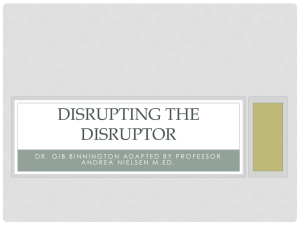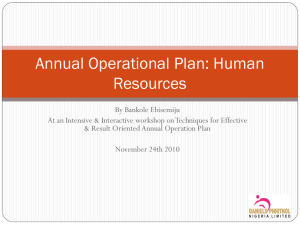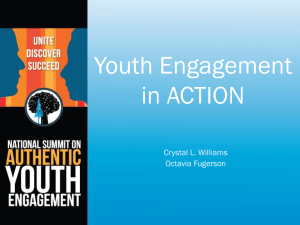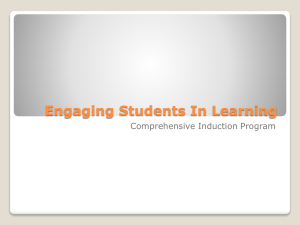The Engaged Curriculum Funding Outline
advertisement
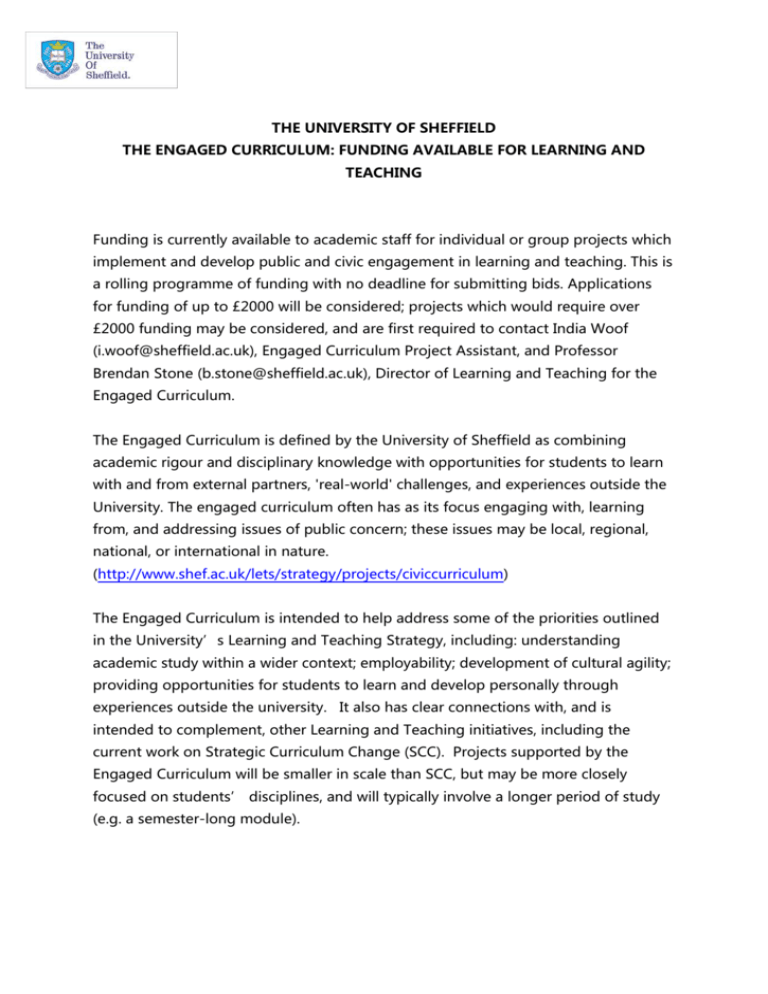
THE UNIVERSITY OF SHEFFIELD THE ENGAGED CURRICULUM: FUNDING AVAILABLE FOR LEARNING AND TEACHING Funding is currently available to academic staff for individual or group projects which implement and develop public and civic engagement in learning and teaching. This is a rolling programme of funding with no deadline for submitting bids. Applications for funding of up to £2000 will be considered; projects which would require over £2000 funding may be considered, and are first required to contact India Woof (i.woof@sheffield.ac.uk), Engaged Curriculum Project Assistant, and Professor Brendan Stone (b.stone@sheffield.ac.uk), Director of Learning and Teaching for the Engaged Curriculum. The Engaged Curriculum is defined by the University of Sheffield as combining academic rigour and disciplinary knowledge with opportunities for students to learn with and from external partners, 'real-world' challenges, and experiences outside the University. The engaged curriculum often has as its focus engaging with, learning from, and addressing issues of public concern; these issues may be local, regional, national, or international in nature. (http://www.shef.ac.uk/lets/strategy/projects/civiccurriculum) The Engaged Curriculum is intended to help address some of the priorities outlined in the University’s Learning and Teaching Strategy, including: understanding academic study within a wider context; employability; development of cultural agility; providing opportunities for students to learn and develop personally through experiences outside the university. It also has clear connections with, and is intended to complement, other Learning and Teaching initiatives, including the current work on Strategic Curriculum Change (SCC). Projects supported by the Engaged Curriculum will be smaller in scale than SCC, but may be more closely focused on students’ disciplines, and will typically involve a longer period of study (e.g. a semester-long module). Proposals should describe how their impact will outlast the funding period and/or how activities will be embedded and sustained at the end of funding, In addition, priority will be given to proposals which address one or more of these themes: Demonstrating active and creative engagement with the theme of ‘inequalities in the city and region’. Engaging with communities and groups which currently have little or no contact with higher education. Addressing issues of sustainability in relation to social, economic and environmental factors. Developing civically/publically engaged modules which use participatory, inquiry-based pedagogies (for existing examples see the link below, or contact India Woof). Embedding existing extra-curricular/ad-hoc engaged learning activities into the curriculum in a sustainable way. Working in collaboration with partners in the city to enhance and achieve the University’s Learning and Teaching goals in relation to employability, cultural agility, communities of learning, and interdisciplinarity. Funding can be spent on any activity which is appropriate to further this learning and teaching priority. This could include: employing postgraduate students to assist in the development of a module or other initiative; holding workshops for internal and external partners; creating undergraduate internships to research opportunities or lead development; workshops to promote and develop engaged learning and teaching; production of learning resources; etc. For existing examples of engaged learning and teaching see: http://www.shef.ac.uk/polopoly_fs/1.277387!/file/Documents_for_Web.pdf For background information on Strategic Curriculum Change see: https://sites.google.com/a/sheffield.ac.uk/strategic-curriculum-change/. For the Learning and Teaching Strategy see: http://www.shef.ac.uk/lets/strategy/lts Cross-disciplinary/interdepartmental bids are welcome. Funded projects will be listed on the project website as funds are allocated. Applications will be dealt with responsively. If you wish to discuss your project ideas before submitting, please contact India Woof and Brendan Stone. To apply, please provide the following details: 1. Name/s of people applying for funding 2. Name of project (no more than 10 words) 3. One paragraph description of project (no more than 75 words). This will be posted on the Academic and Learning Services (ALS) website if project is approved. 4. Give an outline of the proposed activity and a brief project timetable. Indicate how your project addresses one or more of the themes above, and comment on its envisaged impact. Please clearly identify any project outputs. 5. Give details of the costs you are asking for (breakdown and total). 6. Please ensure that you have consulted with your Head of Department or FDLT before submitting your application who will also be able to give you details of faculty/department priorities. Please also copy (cc) your Head of Department into your application email. Successful applicants will be required to write 2/3 short blog posts for the project website, and participate at a project showcase event. Blogging support and guidance will be provided for funding recipients, prior blogging experience is not necessary. The final blog post must be submitted within three months of completing your project, outlining your activity and your experiences in developing and delivering it, as well as its impact. Please email your completed form as an attachment to India Woof, Engaged Curriculum Project Assistant, Academic and Learning Services, i.woof@sheffield.ac.uk
